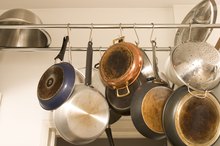Aluminum in Your Diet
Whether you know it or not, you’re surrounded by aluminum. As the most-abundant element on Earth, aluminum is found in the soil, in water and in the air, but most people take in very little from the environment. You also can’t avoid getting it through your diet. As long as you’re healthy, the aluminum you consume is eliminated from your body. But be aware that you can get larger quantities from aluminum-containing food additives.
Values for Aluminum
Aluminum doesn’t fill any beneficial roles in your body, so a recommended intake has not been established. The aluminum content found in foods varies, depending on the soil, the water and how the food is processed. The estimated amount of aluminum in various foods can only be used to illustrate how much you'll get from one food to the next. For comparison, the average adult consumes about 7 to 9 milligrams of aluminum daily through food.
Naturally Occurring Aluminum
Poisons From Aluminum Cookware
Learn More
Beef, poultry, ham, eggs and fresh fruits have 1 milligram or less of aluminum per kilogram of food, according to a report from the Centers for Disease Control and Prevention. The aluminum in different types of fish ranges between 0.1 and 6 milligrams per kilogram. Most fresh vegetables contain 1 to 4 milligrams per kilogram, except for spinach, which has five times more. Tea leaves are one of the rare plants with a very high aluminum content, but not all of it leeches into the water when you prepare a cup of tea. You may get as much as 3.6 milligrams of aluminum per liter of steeped tea. This is about the same amount as fruit juice, but it’s four times higher than coffee and other beverages.
Foods with Additives
Aluminum-containing additives are used as leavening agents in baked goods, as emulsifying agents in processed foods, and as anti-caking ingredients in powders. Except for an additive called bentonite, you can find them listed in the ingredients because their names include the word aluminum. Because of the high amount of aluminum in baking powder, some baked goods have as much as 400 milligrams per kilogram. Processed cheese ranges from 297 to 695 milligrams of aluminum per kilogram. Pickles, cocoa and nondairy creamer are also higher in aluminum, but they're only in the range of 39 to 94 milligrams per kilogram. In spite of the higher values, the amount of aluminum in processed foods is considered safe, according to the U.S. Department of Health and Human Services.
Concerns About Cookware
Foods High in Lithium
Learn More
You don't need to worry about aluminum cookware because most aluminum pots and pans are coated with nonstick finishes or treated with a process that hardens the metal. If you used uncoated aluminum pans for all of your cooking every day, and you stored your food in aluminum containers, you might consume an extra 3.5 milligrams of aluminum daily, according to Clemson Cooperative Extension. Do not store acidic or salty foods, such as tomato sauce, fruits or sauerkraut, in aluminum pots because they allow more of the mineral to get into the food.
Related Articles
References
Writer Bio
Sandi Busch received a Bachelor of Arts in psychology, then pursued training in nursing and nutrition. She taught families to plan and prepare special diets, worked as a therapeutic support specialist, and now writes about her favorite topics – nutrition, food, families and parenting – for hospitals and trade magazines.








